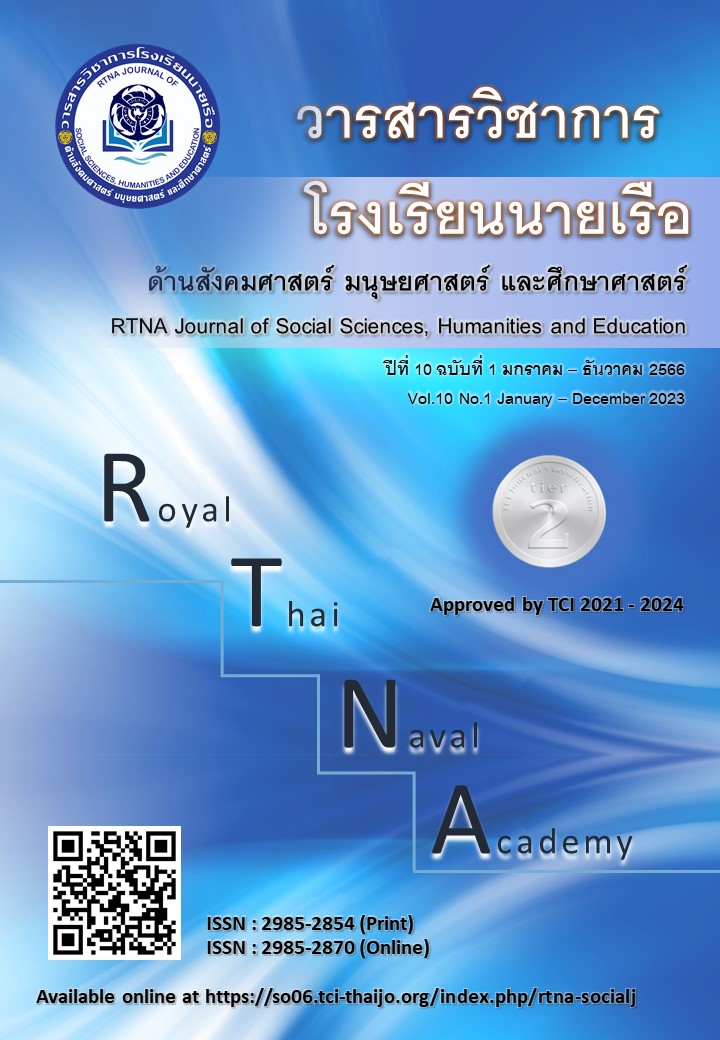The effect of using STEM Education supervision process for Surat Thani teachers
Keywords:
Supervision process, Teacher Development potential, STEM EducationAbstract
This research aims as followings. The first, 1), is to study the effect of using STEM Education supervision process and population groups are teachers in Surat Thani Province. Regarding the effect of using STEM Education, there are 1.1) to compare pre and post using the supervision process the knowledge of STEM Education learning management, 1.2) to study the quality of the STEM Education learning management plan and 1.3) to study the STEM Education learning management behaviors. The second, 2), is to study the satisfaction of teachers towards supervision through the process of STEM Education supervision. The population are 2,034 teachers teaching science, technology and mathematics in the academic year 2021. The target participants in this research were teachers relevant in science, technology and mathematics about 18 participants. These 18 participants were obtained from a specific selection (Purposive sampling). The result revealed that it was necessary to manage learning following the STEM guidelines of teachers. The most necessary was the Integrated learning design followed by the assessment of work processes and students' results. Teachers had higher scores on the STEM Education learning management knowledge test. According to the STEM education approach, the learning management plan's overall quality was at a good level. Regarding STEM Education learning management behaviors, it was found that the overall results of the teachers' first assessment were at a moderate level. The results of the second assessment were at a good level. The teachers' satisfaction with the supervision process of the STEM education approach for teachers in Surat Thani was at the highest level.
References
กมลวรรณ ตังธนกานนท์. (2563). การวัดและประเมินทักษะการปฏิบัติ. (พิมพ์ครั้งที่3). กรุงเทพฯ: สำนักพิมพ์แห่งจุฬาลงกรณ์มหาวิทยาลัย.
กระทรวงศึกษาธิการ. (2560). (ร่าง) กรอบทิศทางแผนการศึกษาแห่งชาติ พ.ศ.2560-2574. กรุงเทพฯ: สำนักงานเลขาธิการสภาการศึกษา กระทรวงศึกษาธิการ.
โชติกา ภาษีผล. (2563). การพัฒนาแบบสอบคู่ขนาน การสร้างและการวิเคราะห์ความเป็นคู่ขนาน. กรุงเทพฯ: สำนักพิมพ์แห่งจุฬาลงกรณ์มหาวิทยาลัย.
ธนวัฒน์ ศรีไพโรจน์. (2561). อิทธิพลของโปรแกรมการโค้ชการจัดการเรียนรู้โดยใช้โครงงานเป็นฐานที่มีต่อ สมรรถนะของครูผู้สอนเพื่อพัฒนาทักษะการเรียนรู้และนวัตกรรมขอ ผู้เรียน. (วิทยานิพนธ์ดุษฎีบัณฑิต). กรุงเทพฯ: ระบบสารสนเทศเพื่อการจัดการ สถาบันวิจัยพฤติกรรมศาสตร์ มหาวิทยาลัยศรีนครินทรวิโรฒ. สืบค้นจาก http://bsris.swu.ac.th/thesis/55199120018RB8992555f.pdf
ธารทิพย์ ขัวนา และขวัญชัย ขัวนา (2562). สะเต็มศึกษาเพื่อการจัดการเรียนรู้สู่ทักษะการทำงานในศตวรรษที่ 21. วารสารบัณฑิตศึกษามหาวิทยาลัยราชภัฎสกลนคร, 16(73), 1-12.
ปาลิตา สุขสำราญ และวารีรัตน์ แก้วอุไร. (2562). การพัฒนารูปแบบการจัดการเรียนรู้วิทยาศาสตร์ตามแนวคิดสะเต็มศึกษาที่ส่งเสริมจิตวิทยาศาสตร์และทักษะการแก้ปัญหาสำหรับนักเรียนระดับประถมศึกษา. JOURNAL OF EDUCATION NARESUAN UNIVERSITY, 21(3), 153-166. สืบค้นจาก https://so06.tci-thaijo.org/index.php/edujournal_nu/article/view/89495
มนสิช สิทธิสมบูรณ์. (2563). การพัฒนาหลักสูตรการจัดการเรียนรู้สะเต็มศึกษาสำหรับครูประถมศึกษา ระดับการศึกษาขั้นพื้นฐาน. วารสารสังคมศาสตร์และมานุษยวิทยาเชิงพุทธ, 5(6), 341–356. สืบค้นจาก https://so04.tci-thaijo.org/index.php/JSBA/article/view/241598
วนินทร สุภาพ. (2561). การจัดการเรียนรู้คณิตศาสตร์ตามแนวทางสะเต็มศึกษา: วิธีการ ความหวัง และความท้าทาย. วารสารศึกษาศาสตร์ มหาวิทยาลัยนเรศวร, 20(4), 302-315.
วรกันยา แก้วกลม, พินิจ ขำวงษ์, และจรรยา ดาสา. (2561). สภาพปัจจุบันปัญหาและความต้องการในการจัดการเรียนรู้ สะเต็มศึกษาของครูวิทยาศาสตร์ระดับชั้นประถมศึกษา. Thailand Veridian E-Journal,Silpakorn University (Humanities, Social Sciences and arts), 11(3), 2092-2112.
วรรณี แกมเกตุ. (2555). วิธีวิทยาการวิจัยเชิงพฤติกรรมศาสตร์. กรุงเทพฯ: จุฬาลงกรณ์มหาวิทยาลัย.
วัชรา เล่าเรียนดี. (2556). ศาสตร์การนิเทศการสอน และการโค้ช การพัฒนาวิชาชีพ: ทฤษฎีกลยุทธ์สู่การปฏิบัติ. (พิมพ์ครั้งที่ 12). นครปฐม: มหาวิทยาลัยศิลปากร วิทยาเขตพระราชวังสนามจันทร์.
ศิริชัย กาญจนวาสี. (2556). ทฤษฎีการทดสอบแบบดั้งเดิม. (พิมพ์ครั้งที่ 7 ฉบับปรับปรุงเพิ่มเติม). กรุงเทพฯ: สำนักพิมพ์แห่งจุฬาลงกรณ์มหาวิทยาลัย.
ศุภวรรณ สัจจพิบูล. (2560). แนวคิดการนิเทศเพื่อพัฒนาสมรรถนะการจัดการเรียนรู้ในศตวรรษที่ 21. วารสารมหาวิทยาลัยศิลปากร ฉบับภาษาไทย สาขาสังคมศาสตร์ มนุษยศาสตร์ และศิลปะ, 37(1), 203-222.
สงัด อุทรานันท์. (2530). การนิเทศการศึกษาหลักการแนวคิดทฤษฎีและปฏิบัติ. (พิมพ์ครั้งที่ 2). กรุงเทพฯ: โรงพิมพ์มิตรสยาม.
สำนักงานศึกษาธิการจังหวัดสุราษฎร์ธานี. (2564) รายงานการประเมินความต้องการจำเป็นในการพัฒนาครูผู้สอนสะเต็มศึกษา จังหวัดสุราษฎร์ธานี ประจำปีการศึกษา 2564. สุราษฎร์ธานี: สำนักงานศึกษาธิการจังหวัดสุราษฎร์ธานี.
Aldahmash, A. H., Alamri, N. M. & Aljallal, M. A. (2019). Saudi Arabian science and mathematics teachers’ attitudes toward integrating STEM in teaching before and after participating in a professional development program. Cogent Education, 6(1), 1-21. https://doi.org/10.1080/2331186X.2019.1580852
Armitage, A. & Cogger, A. (2019). The New Apprenticeships : Facilitating Learning, Mentoring, Coaching and Assessing. Critical Publishing.
Dobber, M., Zwart, R., Tanis, M., & Van Oers, B. (2017). Literature review: The role of the teacher in inquiry-based education. Educational Research Review, 22, 194–214.
Glickman, C., & Burns, R. W. (2021). Supervision and Teacher Wellness: An Essential Component for Improving Classroom Practice. Journal of Educational Supervision, 4(1), 18-25. https://doi.org/10.31045/jes.4.1.3
Goodnough, Karen. (2019). Understanding primary teachers’ professional learning and practice: an activity theory lens. Journal of Curriculum Studies, 51(3), 362-383. https://doi.org/10.1080/00220272.2018.1488997
Kim, S., & Feldt, L. S. (2008). A Comparison of Tests for Equality of Two or More Independent Alpha Coefficients. Journal of Educational Measurement, 45(2), 179–193. http://www.jstor.org/stable/20461888
Legler, Christian E. (2021). Supporting STEM Teachers through Online Induction: An E-Mentor’s Exploration in Cyberspace. Journal of STEM Teacher Education, 56, 46-66. https://doi.org/10.30707/JSTE56.1.1624981200.229968
Loucks-Horsley, S., Stiles, K. E., Mundry, S., Love, N., & Hewson, P. W. (2010). Designing professional development for teachers of science and mathematics. Corwin Press, https://dx.doi.org/10.4135/9781452219103.
Mkimbili, S. T., Tiplic, D., & Ødegaard, M. (2017). The role played by contextual challenges in practicing inquiry-based science teaching in Tanzania “Secondary schools”. African Journal of Research in Mathematics, Science and Technology Education, 21(2), 211- 221.
Pitiporntapin, S., Chantara, P., Srikoom W., Nuangchalerm, P. & Hines, L. M. (2018). Enhancing Thai In-service Teachers’ Perceptions of STEM Education with Tablet-Based Professional Development. Asian Social Science, 10(14), 1911-2025. https://doi.org/10.5539/ass.v14n10p13
Downloads
Published
Issue
Section
License
Copyright (c) 2023 Royal Thai Naval Academy

This work is licensed under a Creative Commons Attribution-NonCommercial-NoDerivatives 4.0 International License.
The author has the sole responsibility for the material published in RTNA Journal of Social Sciences, Humanities, and Education, which the editorial team may not agree on that material.
RTNA Journal of Social Sciences, Humanities, and Education owns the copyright of the text, the illustration, or other material published in the journal. No parts or the whole of the material published may be disseminated or used in any form without first obtaining written permission from the academy.






